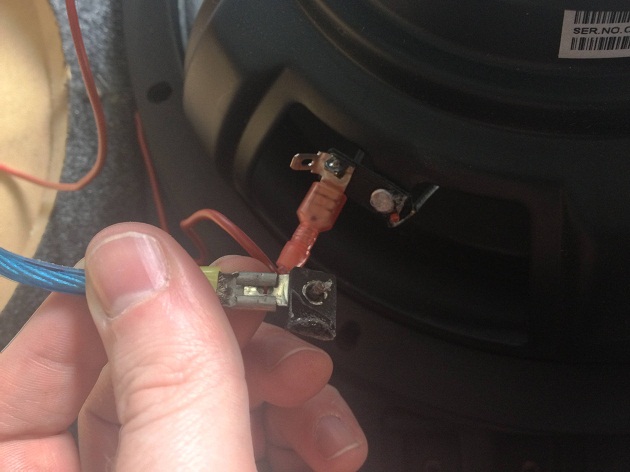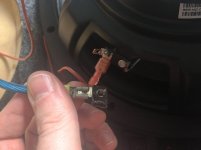For a small 2 way speaker, is 18awg OK for the woofer? Or should I go with 16awg or even 14awg? And is 21awg suitable for the tweeter, or should I go with 18awg here as well?
Just remember that insertion-loss is the enemy and smaller gauges add resistance the longer they get. Shorter will sound better than longer when using same gauge conductors.
That said, a lot of people I know that build have used 18AWG internally in their builds from top to bottom. This is because the coils are no larger than 18AWG a lot of the time. 18AWG can handle 3A of current, which is quite a bit.
While I understand that mantra, my ROT has been 16AWG internally because I like thicker coils, and 14AWG (12+ preferred) or larger for speaker cables.
My 2c,
Wolf
That said, a lot of people I know that build have used 18AWG internally in their builds from top to bottom. This is because the coils are no larger than 18AWG a lot of the time. 18AWG can handle 3A of current, which is quite a bit.
While I understand that mantra, my ROT has been 16AWG internally because I like thicker coils, and 14AWG (12+ preferred) or larger for speaker cables.
My 2c,
Wolf
On the topic of stupid questions. What the hell is AWG? Fwiw I usually use 2 or 3 mm wire.
Last edited:
American Wire Gauge American wire gauge - Wikipedia
Yeah but are there a shorter story? I read something about ohm/feet and logarithmic scale, higher is worse? Why not use mm2?
Not dumb at all.
Much heavier wire could strain the terminals on the drivers.
I don't really see this as a problem at all. Speaker terminals usually riveted solidly to the frame.
I offer some reinforcement to help put your mind at ease, Greg.
The resistance of a short length of 18 AWG internal wiring is so small as to be negligible.
It is only with long external runs that thicker gauge cable is necessary.
And, as rayma says, heavy gauge internal wiring can put undue strain on the driver terminals.
The resistance of a short length of 18 AWG internal wiring is so small as to be negligible.
It is only with long external runs that thicker gauge cable is necessary.
And, as rayma says, heavy gauge internal wiring can put undue strain on the driver terminals.
Yeah but are there a shorter story? I read something about ohm/feet and logarithmic scale, higher is worse? Why not use mm2?
One benefit of awg is that it’s based on solid wire and when a stranded wire is labeled as such it represents it’s solid counterpart.
I don't really see this as a problem at all. Speaker terminals usually riveted solidly to the frame.
More terminals can (and do) break than you might imagine. Not the rivet, though.
Last edited:
Worth a read: Speaker Wire
Great reference. But the snake oil companies and their loyal followers will insist that they "can hear the difference" and if you can't then there must be something wrong with you.
More terminals can (and do) break than you might imagine. Not the rivet, though.
I think that you may be imagining things, not me.
I don't know why terminals on a decent quality driver should be breaking just because a short piece of 16 gauge wire is attached to them.
If they are breaking then someone is applying a lot more strain on them than just the wire itself.
Last edited:
P.S. I've seen some crazily thick wire attached to driver terminals!
I've also seen ridiculously thick wires partially soldered to small tweeter terminals. That's just waiting for the few supporting strands of wire to break, if not the tweeter terminals themselves.
I've also seen ridiculously thick wires partially soldered to small tweeter terminals. That's just waiting for the few supporting strands of wire to break, if not the tweeter terminals themselves.
What if the terminals are not of a decent quality?
See attachment.
Then it's not a decent quality driver to begin with.
My statement was that terminals on a decent quality driver should not be breaking. If it's a cheap, junky driver that's a different story.
Great reference. But the snake oil companies and their loyal followers will insist that they "can hear the difference" and if you can't then there must be something wrong with you.
I have heard differences, but that was between lampcord and a sheap speaker wire, not any difference really when I changed for even better cables. But it was a long time ago now, the system wasn't very good either.
I run Jenving cables now because they are easy to get here, and the price is more than reasonable. 🙂
maybe because i spent a lot of time moving gear in my PA days, i always used cable ties (zap straps) to the driver leg to mechanically support any unattached/unsupported lengths of of box wiring to prevent this exact thing from happening.
 and even in a home hifi setting don't underestimate the damage that gravity and vibration combined with a sufficient gauge wire can bring, when possible based on driver shape i've also strapped around magnets.
and even in a home hifi setting don't underestimate the damage that gravity and vibration combined with a sufficient gauge wire can bring, when possible based on driver shape i've also strapped around magnets.
- Home
- Loudspeakers
- Multi-Way
- Dumb Internal Wiring Question
